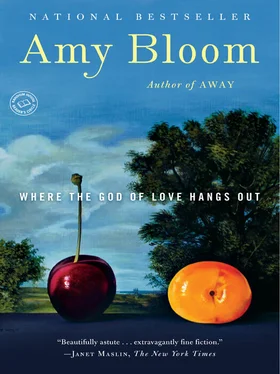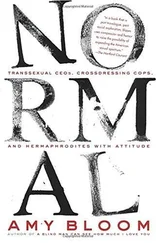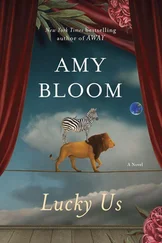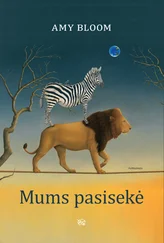I got into my kimono and sat in the rocking chair, waiting for Lion. I watched the guests on the talk shows, none of whom seemed like people I’d want to know. After a while, I turned off the sound but kept the picture on for company. I watered my plants, then realized I had just done it yesterday and watched as the water cascaded out of the pots onto the wood floor, drops bouncing onto the wall, streaking the white paint. I thought about giving away the plants, or maybe moving somewhere where people didn’t keep plants. Around here, it’s like a law. The mopping up took me about eight minutes, and I tried to think of something else to do. I looked for a dish to break.
Stupid, inconsiderate boy. Around now, his father would have been pacing, threatening to beat him senseless when he walked in, and I would have been calming Lionel down, trying to get him to come to bed.
At about three, when I was thinking of calling the hospital, I heard my car coming up the street slowly. I looked out the kitchen window and saw him pull into the drive, minus the right front fender.
He came inside quietly, pale gray around his mouth and eyes. There was blood on his shirt, but he was walking okay. I grabbed him by the shoulders and he winced and I dug my hands into him in the dark of the hallway.
“What is wrong with you? I don’t have enough to contend with? Do you know it’s three o’clock in the morning? There were no phones where you were, or what? It was too inconvenient to call home, to tell me you weren’t lying dead somewhere? Am I talking to myself, goddammit?”
I was shaking him hard, wanting him to talk back so I could slap his face, and he was crying, turning his face away from me. I pulled him into the light of the kitchen and saw the purple bruise, the shiny puff of skin above his right eyebrow. There was a cut in his upper lip, making it lift and twist like a harelip.
“What the hell happened to you?”
“I got into a little fight at the Navigator and then I had sort of an accident, nothing serious. I just hit a little tree and bumped my head.”
“You are an asshole.”
“I know, Ma, I’m sorry. I’ll pay you back for the car so your insurance won’t go up. I’m really sorry.”
I put my hands in my pockets and waited for my adrenaline to subside.
I steered him into the bathroom and sat him down on the toilet while I got some ice cubes and wrapped them in a dish towel; that year I was always making compresses for Buster’s skinned knees, busted lips, black eyes. Lion sat there holding the ice to his forehead. The lip was too far gone.
I wasn’t angry anymore and I said so. He smiled lopsidedly and leaned against me for a second. I moved away and told him to wash up.
“All right, I’ll be out in a minute.”
“Take your time.”
I sat on the couch, thinking about his going away and whether or not Jeffrey would be good company for him. Lion came out of the bathroom without his bloody shirt, the dish towel in his hand. He stood in the middle of the room, like he didn’t know where to sit, and then he eased down onto the couch, tossing the towel from hand to hand.
“Don’t send me away. I don’t want to go away from you and Grandma and Buster. I just can’t leave home this summer. Please, Ma, it won’t — what happened won’t happen again. Please let me stay home.” He kept looking at his hands, smoothing the towel over his knees and then balling it up.
How could I do that to him?
“All right, let’s not talk about it any more tonight.”
He put his head back on the couch and sighed, sliding over so his cheek was on my shoulder. I patted his good cheek and went to sit in the brown chair.
I started to say more, to explain to him how it was going to be, but then I thought I shouldn’t. I would tell him that we were looking at wreckage and he would not want to know.
I said good night and went to my bedroom. He was still on the couch in the morning.
We tried for a few weeks, but toward the end of the summer Lion got so obnoxious I could barely speak to him. Ruth kept an uncertain peace for the first two weeks and then blew up at him. “Where have your manners gone, young man? After all she did for you, this is the thanks she gets? And Julia, when did you get so mush-mouthed that you can’t tell him to behave himself?” Lion and I looked at our plates, and Ruth stared at us, puzzled and cross. I came home from work on a Friday and found a note on the kitchen table: Friends called with a housepainting job in Nantucket. Will call before I go to Paris. Will still do junior year abroad, if that’s okay. L . “If that’s okay” meant that he wanted me to foot the bill, and I did. I would have done more if I had known how.
It’s almost summer again. Buster and I do pretty well, and we have dinner every Sunday with Ruth, and more often than not, we drive her over to bingo on Thursday evenings and play a few games ourselves. I see my husband everywhere; in the deft hands of the man handing out the bingo cards, in the black-olive eyes of the boy sitting next to me on the bench, in the thick, curved back of the man moving my new piano. I am starting to play again and I’m teaching Buster.
Most nights, after I have gone to bed, I find myself in the living room or standing on the porch in the cold night air. I tell myself that I am not waiting, it’s just that I’m not yet awake.
For fifteen years, I saw my stepmother only in my dreams.
After my father got sick in the spring of my sophomore year, dying fast and ugly in the middle of June, I went to Paris to recover, to become someone else, un homme du monde , an expert in international maritime law, nothing like the college boy who slept with his step mother the day after his father’s funeral. We grieved apart after that night, and I left Julia to raise my little brother, Buster, and pay all the bills, including mine. Buster shuttled back and forth for holidays, even as a grown man, calm and affectionate with us both, bringing me Deaf Smith County peanut butter from my mother for Christmas morning, carrying home jars of Fauchon jam from me, packed in three of his sweat socks. My mother’s letters came on the first of every month for fifteen years, news of home, of my soccer coach’s retirement, newspaper clippings about maritime law and French shipping lines, her new address in Massachusetts, a collection of her essays on jazz. I turned the book over and learned that her hair had turned gray.
“You gotta come home, Lionel,” my brother said last time, his wife sprawled beside him on my couch, her long, pretty feet resting on his crotch.
“I don’t think so.”
“She misses you. You know that. You should go see her.”
Jewelle nodded, digging her feet a little further, and Buster grinned hugely and closed his eyes.
“You guys,” I said.
My brother married someone more beautiful and wild than I would have chosen. They had terrible, flying-dishes fights and passionate reconciliations every few months, and they managed to divorce and remarry in one year, without even embarrassing themselves. Jewelle loved Buster to death and told me she only left when he needed leaving, and my brother would say in her defense that it was nothing less than the truth. He never said what he had done that would deserve leaving, and I can’t think that it was anything very bad. There is no bad even in the depths of Buster’s soul, and when I am sick of him, his undaunted, fat-and-sassy younger-brotherness, I think that there are no depths.
When Buster and Jewelle were together (usually Columbus Day through July Fourth weekend), happiness poured out of them. Buster showed slides of Jewelle’s artwork, thickly layered slashes of dark paint, and Jewelle cooked platters of fried chicken and bragged on his triumphs as a public defender. When they were apart, they both lost weight and shine and acted like people in the final stage of terminal heartbreak. Since Jewelle’s arrival in Buster’s life, I have had a whole secondhand love affair and passionate marriage, and in return Buster got use of my apartment in New York and six consecutive Labor Days in Paris.
Читать дальше












